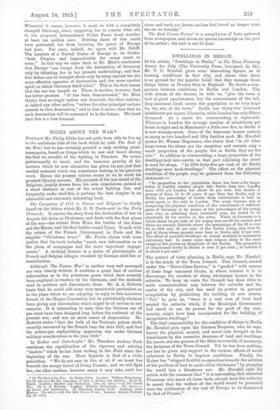BOOKS ABOUT THE WAR, PERHAPS Mr. Philip Gibbs has not
quite been able to live up to the ambitious title of the book which be calls The Soul of the War, k but he has certainly painted a very striking phan- tasmagoria, based on things which he saw and heard during the first 'six months of the fighting in Flanders. He writes picturesquely as usual, and the immense gravity of the matters which he now chronicles has given his pen just that needed restraint which was sometimes lacking in his previous work. Hence the present volume seems to us to mark his greatest literary success. His account of the last stand of the Belgians, largely drawn from his own experiences gained at a short distance in rear of the actual fighting line, and frequently under shell-fire, is perhaps the best chapter in an adMirible and extremely interesting book.
The Campaign of 1914 in France and Belgiums is chiefly based on the letters which Mr. G. H. Perris sent to the Daily Chronicle. It carries the story from the declaration of war on August 4th down to Christmas, and deals with the first phase of the war—the retreat from Mons, the battles of the Aisne and the Marne, and the first battles round Ypres. It ends with the return of the French Government to Paris and the singular "Christmas truce." Mr. Perris claims with some justice that his book includes "much new information as to the plans of campaigns and the more important engage- ments." A striking feature is a series of photographs of French and Belgian villages wrecked by German shell-fire or incendiariem.
Although The Poison Wars is neither very well arranged nor very clearly written, it contains a great deal of curious information as to the poisonous gases which have recently been employed in warfare by the Germans, and the methods used to produce and disseminate them. Mr. A. A. Roberta hints that he could add some very remarkable particulars as to the plans which we are adopting in reply to this notorious breach of the Hague Convention, but be patriotically abstain from giving any information which might be of service to our enemies. It is interesting to note that the German use of gas must have been designed long before the outbreak of the present war, and was no mere resort of desperation. Mr. Roberts states "that the bulk of the Teutonic poison shells recently recovered by the French bear the date 1911, and that the poison-gas asphyxiating apparatus was under German military consideration in the year 1909."
In Kulfur and Catasirophe4 Mr. Theodore Andrea Cook continues the republication of the vigorous and stirring "leaders" which he has been writing in the Field since the beginning of the war. Their keynote is that of a virile patriotism. "We do not care to live at all if we must live beneath the savage threat of living Prussia; and we will fight her, one after another, however many it may take, until her • (l) The Soul of the War. By Philip Gibbs. Loudon : William Heinemann. [7e. Gd. (2) The Campaign of 1914 in Prance and Belgium. By 0. H. Perris. London : Hodder and Stoughton. [10s, 61. not.]—(3) Thu Poimm Wu'. By A. A. Roberts. Lousclou: 'William Heinemann. De. not..]-- (4) Kaitar and Catastrophe. By Theodore Andrea Cook. London: John Murray, [is. net.]—(5) The Real Crown Ptincf. London George Newnes.
[2e. 61. not.] •
claws and teeth are drawn and her foul brood no longer taint the air we breathe."
The Real Crown Princes is a compilation of facts gathered from newspapers, and shows no special knowledge on the part of its author; the task is not ill done.


































 Previous page
Previous page